In this way Shelga's deductions led him to a fresh search of the kitchen. He moved some boxes away from the wall and discovered the trap-door of a cellar such as are often built directly under the kitchen in suburban summer bungalows. Tarashkin lit a candle end and, lying on his stomach, provided light for Shelga who made his way carefully down a slimy, half-rotten ladder into the damp cellar.
"Come down here with the candle," called Shelga out of the darkness, "this is where he had his real laboratory."
The cellar occupied the whole area under the house: along the brick walls stood rough plank tables on trestles, cylinders of gas, a small engine and dynamo, glass baths such as are used for electrolysis, mechanic's tools and everywhere, on all the tables, little heaps of ash...
"This is what he was doing here," muttered Shelga in some perplexity, examining the thick wooden beams and sheets of iron that stood leaning against the wall. The beams and the sheets of metal were all drilled through in many places, some of them were cut in two and the places where they were drilled or cut showed signs of burning or molten metal.
In an oak board standing on end the holes were no more than a tenth of a millimetre in diameter as though they had been made with a needle. In the middle of the board, in big letters, was the name, P. P. Garin. Shelga turned the board round and on the other side he saw the same letters in reverse; by some unknown means the inscription had been burnt through a three-inch oak board.
"What the hell!..." exclaimed Shelga. "That P. P. Garin wasn't engaged in pyrotechnics here."
"Vasily Vitalyevich, what's this?" asked Tarashkin, showing him a pyramid about an inch and a half high on a base of about an inch made of some compressed grey substance.
"Where did you find it?"
"There's a whole box full of them over there."
Shelga turned the pyramid this way and that, smelled it, placed it on the edge of the table, jabbed a burning match into the side of it and moved away to the far corner of the cellar. The match burned down, the pyramid burst into flame, giving off a blinding, bluish-white light. It burned for five minutes and some seconds, without smoke and almost odourless.
"It probably wouldn't be advisable to try a trick like that a second time," said Shelga. "That pyramid might have been a gas candle and we wouldn't have got out of here if it had been. But what have we found out? Let's go over the evidence. Firstly, the murder was not committed for revenge or robbery. Secondly, we know the name of the murdered man, P. P. Garin. And so far, that's all. Of course you would say it was Garin who went away in the boat. I don't think so. Garin himself wrote his name on that board. It's a matter of psychology. If I, for instance, were to invent such a tricky gadget I'd be so pleased with myself that I'd write my own name and not somebody else's. We know that the dead man worked in the laboratory; that can only mean one thing, he is the inventor, that is, Garin." Shelga and Tarashkin climbed out of the cellar and smoked cigarettes on the porch while they waited for the detective to arrive with the dog.
A fat, reddish hand appeared over one of the counters of the Central Post-Office where foreign telegrams were accepted, a hand with a telegraph form held between trembling fingers.
The reception clerk looked at the hand for some seconds and at last realized what was wrong: "There's a finger missing, the little finger." Then he took the form.
"Semyonov, Marszalkowska, Warszawa. Mission half fulfilled. Engineer gone, documents not obtained. Awaiting instructions. Stas."
The clerk underlined the word "Warszawa" with a red pencil. Then he stood up and looked over the grille at the sender of the telegram. The latter proved to be a massive, middle-aged man with a yellow-grey, unhealthy-looking, puffed face and drooping yellow moustaches that covered his mouth. His eyes were hidden behind the narrow slits formed by his swollen eyelids. His shaven head was surmounted by a brown velvet cap.
"What's the matter?" he asked gruffly. "Take the telegram."
"The telegram is in code," said the clerk.
"What d'you mean, in code? Don't talk nonsense. It's a commercial telegram and you must accept it. I'll show you my papers, I belong to the Polish Consulate and shall hold you responsible for a minute's delay."
Four-Fingers grew angry, his cheeks shook, he barked rather than spoke, but the hand which lay on the counter was still trembling.
"You see," said the clerk, "although you assure me that your telegram is commercial, I'm equally sure that it's political and in code."
The clerk smiled. The yellow-faced gentleman fumed and raised his voice but did not notice a girl take his telegram to a table where sat Vasily Vitalyevich Shelga examining all outgoing telegrams dispatched that day.
He glanced at the form: "Marszalkowska, Warszawa," and then went round the partition into the public room, stood behind the infuriated sender and made a sign to the clerk. The latter sniffed, muttered something disparaging about the panowe and sat down to write out a receipt. The Pole snorted irascibly, shifting his weight from one foot to another so that his patent-leather shoes squeaked. Shelga looked closely at his big feet. Going to the door he indicated the Pole to the detective on duty.
"Follow him."
The morning before the dog had led them from the cottage in the birch grove to the River Krestovka where the murderers had apparently got into a boat. The day had brought nothing new. It seemed obvious that the criminals had gone to ground in Leningrad. The examination of telegrams had also been fruitless. Only that last telegram, addressed to Semyonov in Warsaw, might possess a certain interest.
The reception clerk gave the Pole his receipt and the latter fumbled in his vest pocket for small change. At that moment a handsome, dark-eyed man with a pointed beard came up to the counter with a telegraph form in his hand and, waiting his turn, gazed with calm hostility at the expansive stomach of the bad-tempered Pole.
Then Shelga saw the man with the pointed beard suddenly straighten up: he had noticed the four-fingered hand and glanced at the Pole's face.
Their eyes met. The Pole's jaw dropped. His puffy eyelids opened wide. Terror filled his dull eyes. His face, like the skin of a monstrous chameleon, changed to a leaden hue.
It was only then that Shelga recognized the bearded man who confronted the Pole: it was the double of the man who had been murdered in the house in the birch grove on Krestovsky Island...
The Pole gasped and made for the door with unbelievable speed. As the detective on duty there had only been ordered to follow him, he allowed him to pass through the door and slipped out after him.
The murdered man's double remained standing at the counter. His cold, dark-ringed eyes expressed nothing but surprise. He shrugged his shoulders and when the Pole had disappeared handed a telegram to the clerk.
"Poste Restante No. 555, Boulevard Batignolles, Paris. Begin analysis immediately, improve quality by fifty per cent, shall expect first consignment middle May. P. P."
"The telegram concerns scientific research on which my companion is engaged in Paris where he was sent by the Institute of Inorganic Chemistry," he said to the clerk. Leisurely he pulled a box of cigarettes out of his pocket, took one out, tapped it on the box and lit it with great care. Shelga spoke to him courteously.
"Might I have a couple of words with you."
The bearded man glanced at him, lowered his eyelids and answered with utmost politeness:
"Certainly."
"I am an agent of the Criminal Investigation Department," said Shelga, showing his card. "Perhaps we can find a more convenient place for a talk."
Читать дальше
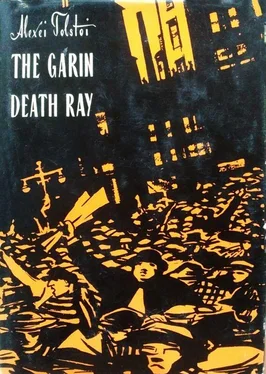
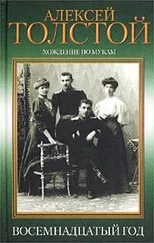

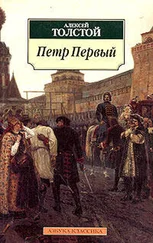
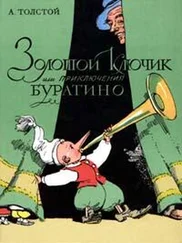
![Алексей Николаевич Толстой - Хождение по мукам [litres]](/books/26263/aleksej-nikolaevich-tolstoj-hozhdenie-po-mukam-litr-thumb.webp)
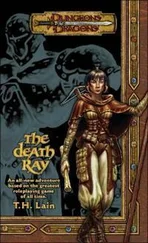

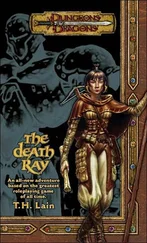


![Алексей Николаевич Толстой - Гиперболоид инженера Гарина. Аэлита [Художник Г. Зубковский]](/books/423486/aleksej-nikolaevich-tolstoj-giperboloid-inzhenera-ga-thumb.webp)
